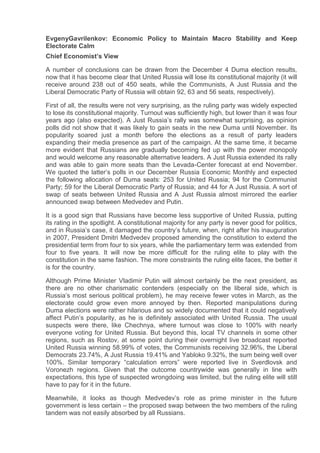
Evgeny Gavrilenkov: Economic Policy to Maintain Macro Stability and Keep Electorate Calm
- 1. EvgenyGavrilenkov: Economic Policy to Maintain Macro Stability and Keep Electorate Calm Chief Economist’s View A number of conclusions can be drawn from the December 4 Duma election results, now that it has become clear that United Russia will lose its constitutional majority (it will receive around 238 out of 450 seats, while the Communists, A Just Russia and the Liberal Democratic Party of Russia will obtain 92, 63 and 56 seats, respectively). First of all, the results were not very surprising, as the ruling party was widely expected to lose its constitutional majority. Turnout was sufficiently high, but lower than it was four years ago (also expected). A Just Russia’s rally was somewhat surprising, as opinion polls did not show that it was likely to gain seats in the new Duma until November. Its popularity soared just a month before the elections as a result of party leaders expanding their media presence as part of the campaign. At the same time, it became more evident that Russians are gradually becoming fed up with the power monopoly and would welcome any reasonable alternative leaders. A Just Russia extended its rally and was able to gain more seats than the Levada-Center forecast at end November. We quoted the latter’s polls in our December Russia Economic Monthly and expected the following allocation of Duma seats: 253 for United Russia; 94 for the Communist Party; 59 for the Liberal Democratic Party of Russia; and 44 for A Just Russia. A sort of swap of seats between United Russia and A Just Russia almost mirrored the earlier announced swap between Medvedev and Putin. It is a good sign that Russians have become less supportive of United Russia, putting its rating in the spotlight. A constitutional majority for any party is never good for politics, and in Russia’s case, it damaged the country’s future, when, right after his inauguration in 2007, President Dmitri Medvedev proposed amending the constitution to extend the presidential term from four to six years, while the parliamentary term was extended from four to five years. It will now be more difficult for the ruling elite to play with the constitution in the same fashion. The more constraints the ruling elite faces, the better it is for the country. Although Prime Minister Vladimir Putin will almost certainly be the next president, as there are no other charismatic contenders (especially on the liberal side, which is Russia’s most serious political problem), he may receive fewer votes in March, as the electorate could grow even more annoyed by then. Reported manipulations during Duma elections were rather hilarious and so widely documented that it could negatively affect Putin’s popularity, as he is definitely associated with United Russia. The usual suspects were there, like Chechnya, where turnout was close to 100% with nearly everyone voting for United Russia. But beyond this, local TV channels in some other regions, such as Rostov, at some point during their overnight live broadcast reported United Russia winning 58.99% of votes, the Communists receiving 32.96%, the Liberal Democrats 23.74%, A Just Russia 19.41% and Yabloko 9.32%, the sum being well over 100%. Similar temporary “calculation errors” were reported live in Sverdlovsk and Voronezh regions. Given that the outcome countrywide was generally in line with expectations, this type of suspected wrongdoing was limited, but the ruling elite will still have to pay for it in the future. Meanwhile, it looks as though Medvedev’s role as prime minister in the future government is less certain – the proposed swap between the two members of the ruling tandem was not easily absorbed by all Russians.
- 2. Given all this and United Russia’s declining popularity, we can expect to see more cautions domestic policies. As populist pre-election spending does not produce the expected results, but threatens to destabilize the macroeconomic environment in the country, we expect budgetary policy to become more cautious in the future. We have continually stated in the past that Russia’s strength has been its decent macroeconomic policies in recent years, aimed at maintaining growth and disinflating the economy. It would be quite reasonable for the government to secure the same trends and not destabilize generally positive macroeconomic trends. That said, we do not think the relatively poor election results will encourage the administration to let budgetary spending get out of control. We also expect monetary policy to remain generally unchanged and follow the same trend of greater exchange rate flexibility. At the same time, one should not be overly optimistic about any broader range of structural reforms, which will continue to remain gradual. The main positive effect will slowly come from WTO accession due to stronger external regulatory pressure on the Russian bureaucracy. The economy and society will continue muddling through (i.e. the economy growing, but at a moderate pace, while society continues to wake up gradually), as it appears that society and the ruling elite are not ready or willing to see faster economic growth in the country. Structural and institutional reforms leading to faster economic growth and rising wealth stimulate growth in a society’s self- consciousness, which threatens the ruling elite, while society in general so far seems to be comfortable with the pace of development.
